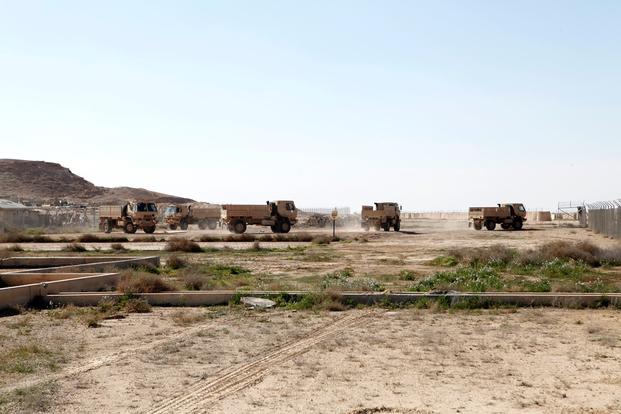The first death of a U.S. Marine in combat against the Islamic State in Iraq and the wounding of several others in a rocket attack Saturay highlights the difficulty of the U.S. military's "accelerated" campaign to take back Mosul and Raqqa from the militant group.
The Defense Department on Sunday identified the Marine as Staff Sgt. Louis F. Cardin, of Temecula, California, who died of wounds suffered when the enemy attacked his unit with rocket fire. He was assigned to the 2nd Battalion, 6th Marine Regiment, 26th Marine Expeditionary Unit, based at Camp Lejeune in North Carolina.
Defense Secretary Ashton Carter has repeatedly said the military is on an "accelerated," if indefinite, timetable to oust the Islamic State in Iraq and Syria from its two main strongholds. He said last Friday that President Barack Obama has been pressing for it to happen before he leaves office.
"That's what he (Obama) said he wants," Carter said at a Politico Playbook breakfast. "That's what he's told me and Gen. Dunford," referring to Joint Chiefs Chairman Marine Gen. Joseph Dunford.
Carter has said that taking Raqqa, the self-proclaimed capital of ISIS in northeastern Syria and Mosul in northwestern Iraq were the keys to defeating the terrorist group. Obama has told him to "get this done as soon as possible. I'd like to not leave this to my successor," Carter said.
When asked about Obama's remarks as relayed by Carter, Air Force Col. Pat Ryder, a spokesman for U.S. Central Command, echoed previous statements by officials at CentCom, Combined Joint Task Force-Operation Inherent Resolve in Baghdad and Carter himself in declining to give a schedule for taking Raqqa and Mosul.
"I'm not going to put a timeline on it," Ryder said, while adding that the U.S. military was "moving as fast as possible" in concert with the capabilities on the ground of the Iraqi Security Forces and Kurdish Peshmerga fighters in Iraq and with the Syrian Democratic Forces in Syria.
Ryder spoke in a phone briefing from CentCom headquarters in Tampa to the Pentagon on Friday, a day before the announcement of the Marine's death at a firebase in Mahmour, about 60 miles southeast of Mosul.
Using another acronym for ISIS, Ryder said that "ISIL is heavily contesting those areas" around Mahmour to prevent an Iraqi security forces buildup there for an eventual assault on Mosul and also in the area northwest of Baiji, where Iraqi forces have been attempting to clear a path up the Tigris river valley up to Mahmour.
Ryder also noted continuing ISIS attacks in and around Ramadi in southern Anbar province, which Iraqi forces declared cleared on Feb. 9 after a months-long offensive to retake the city about 70 miles west of Baghdad. "ISIL may have lost this terrain but they haven't given up on it," he said.
The Marine killed Saturday and the others who were wounded were "providing force protection fire support at a recently established coalition fire base near Makhmour" and had come under fire from ISIS rockets, Pentagon Press Secretary Peter Cook said in a statement on Saturday.
"This is the second combat death since the start of Operation Inherent Resolve, and it reminds us of the risks our men and women in uniform face every day," Cook said.
The first U.S. service member to be killed in combat in Iraq since the U.S. began bombing ISIS in August 2014 was 39-year-old Special Operations Army Master Sgt. Joshua L. Wheeler. He was killed last October in a firefight while coming to the aid of Kurdish Peshmerga fighters in a raid to free hostages in an ISIS prison near Mahmour.
Wheeler's death appeared to conflict with the rules against "boots on the ground" combat and limiting the U.S. military's role to the air campaign and training, advising and assisting local forces.
However, Carter said shortly after the raid in which Wheeler was killed, "This is combat" and "we expect do to do more of this kind of thing."
Dunford said again last week in testimony to the Senate Armed Services Committee that operations to retake Raqqa and Mosul had already begun in the form of "shaping" operations to isolate the two cities. He also declined to put a timetable on the assaults.
"It's already started, it's a slow and steady squeeze," Brett McGurk, the U.S. special envoy to the coalition formed to combat ISIS, said in an address last Saturday to the American University of Iraq at Sulaymaniyah, The Washington Post reported. However, "it's going to be a long campaign," McGurk said.
Despite the resilience shown by ISIS, an analysis by IHS Jane's last week said the campaign to defeat the terrorist group was succeeding and had reached a "turning point" in terms of loss of territory and efforts to cut off the group's funding and its ability to recruit foreign fighters.
"The tide of the war is turning against the Islamic State," HIS Jane's said. "The Islamic State is increasingly isolated, and being perceived as in decline."
--Richard Sisk can be reached at Richard.Sisk@Military.com.






























